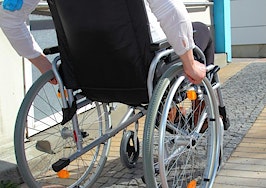- Development of smaller spaces is a growing trend.
- Smaller retail isn't just hip; it can encourage walkability and neighborhood character.
- Smaller hotels, fitness studios, and grocery stores add interest and intimacy.
Los Angeles may be a city of cranes at the moment, with mega skyscrapers such as Wilshire Grand and Metropolis going up.
But the biggest trend in the City of Angels might be much smaller: the use of compact spaces to serve needs that were once only met by locations with massive square footage.
It’s part of an overall trend toward experiences that feel more personal.
People are less interested in mega brands and drawn to smaller brands that feel more targeted and intimate.
This trend also dovetails with the walkability factor that has been cited as a must-have by millennials and others. People want to easily walk or bike to most of their favorite spots and leave the car at home.
Retailers are finding that instead of big-box stores, they may get more mileage out of smaller stores, each tailored to the location to create a unique experience.
The idea is to appeal to consumers who are turning away from globalized, uniform places and pivoting toward spots that capture a more local and authentic experience. Even mega chains like Target are going smaller to lure consumers.
In L.A., amid the açai bowl shops, PokeBars and vape stores, we are also seeing other innovative uses of smaller spaces:
Boutique fitness
It used to be that to open a fitness center you needed a massive space to fill with large machines, room for classes and large locker rooms.
Currently the hottest trends in fitness such as SoulCycle and Orangetheory occupy smaller spots, which allow them to sandwich into smaller storefronts.
With services such as ClassPass, fitness devotees can bop from class to class and place to place without investing in a membership.
Co-working
WeWork and Cross Campus are the biggies, but there are plenty of smaller startups moving into this space.
The next iteration of this trends is more focused co-working for different types of companies and individuals. Look for women-centered spaces as well as spaces catering to scientific startups to become more popular.
Some of these spaces are large but a lot of these can be smaller and more intimate.
Smaller grocery stores
Millennials tend to be fans of the smaller grocery experience. The Whole Foods 365 in Silver Lake is a good example.
We may see other brands making stores with fewer rows of packaged goods, more options in the prepared meal section, and more experiential options such as wine bars or cooking demos.
Microhotels
Somewhere between the impersonal ease of a major hotel chain and the quirky charm of an Airbnb lies the micro hotel. The five-suite Hotel Covell in Los Feliz created a lot of buzz when it opened, and this trend is also catching on in Philadelphia and Washington, D.C., among other places.
What does this mean for local real estate?
Smaller shops and businesses add charm and variation to neighborhoods and satisfy the demand for walkable neighborhoods with plenty of amenities.
It also offers an opportunity for the many former large retail spots to be made into new mixed-use developments such as projects recently announced in Panorama City and La Crescenta.
Deidre Woollard is the co-founder of Lion & Orb, a real estate public relations company. Follow her on Twitter @Deidre.





